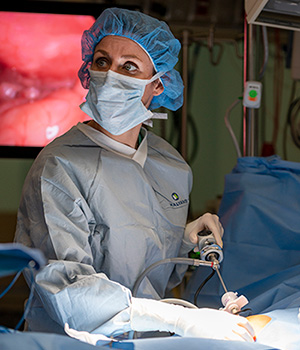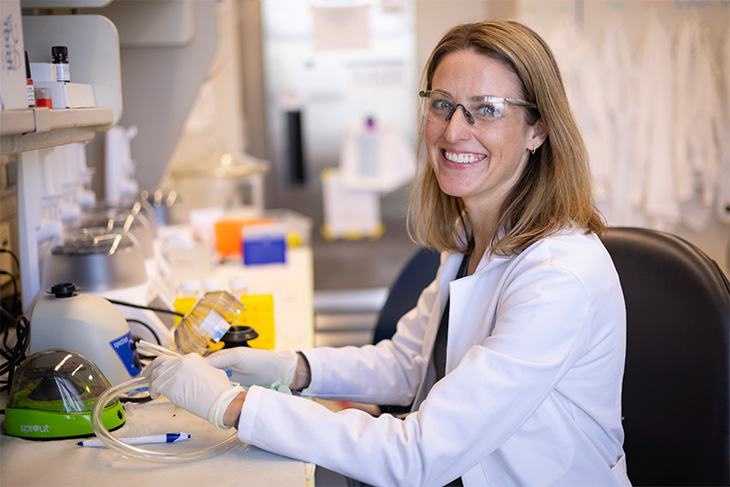Pediatric surgeon receives Hartwell Foundation award for biomedical research
Award will fund stem cell engineering for neuroblastoma therapy
Neuroblastoma is the leading cause of cancer death in children under the age of five. Thanks to an award from The Hartwell Foundation, UC Davis pediatric surgeon Erin Brown will develop a stem cell treatment to target this difficult-to-treat disease.
Brown is one of only ten scientists selected to receive the 2024 Individual Biomedical Research Award. This prestigious award funds early-stage, innovative biomedical research that benefits children in the United States. She will get $100,000 per year for three years.
“We are extremely proud of Dr. Brown’s selection for this prestigious award. She is effectively melding her career as a surgeon with making discoveries that can revolutionize the treatment of many patients,” said Kim Barrett, vice dean for research and distinguished professor of physiology and membrane biology. “We are also grateful once again to the Hartwell Foundation for their support of our faculty who are seeking to address unmet needs in childhood diseases.”
About neuroblastoma

Neuroblastoma is the most common solid tumor in children under 5. It affects 1 in 100 children. The cancer starts in immature nerve cells and can spread in the body in the most aggressive form of this disease.
Current treatments for neuroblastoma include surgery, chemotherapy, radiation therapy and stem cell transplants. Yet, the survival rate is less than 45%, and disease recurrence is common.
“This devastating childhood disease has a dismal survival rate,” said Brown, a specialist in minimally invasive surgery, cancer and fetal intervention. “Treatments tend to have strong side effects, severely affecting a patient’s quality of life. Finding new therapies that improve survival and also limit treatment side effects would be a crucial step forward.”
Brown as a cancer researcher
Brown is the director of the UC Davis Pediatric Surgical Oncology program. She has an impressive research background. She did two years of cellular therapy research as a California Institute of Regenerative Medicine (CIRM) scholar and completed a Mentored Clinical Research Training Program.
She was also selected as a UC Davis Paul Calabresi Clinical Oncology K12 Scholar. Her work was supported by CIRM, the National Institutes of Health, the Clinical and Translational Science Center and the UC Davis Comprehensive Cancer Center.
With this new grant, she will focus on developing a better way to directly deliver treatment to the tumor and reduce unwanted reactions to therapy.

Stem cells to deliver targeted treatments
Brown will develop mesenchymal stem cells (MSCs) that can carry and deliver microRNAs (miRs) to targeted tumor cells. The miRs are small RNAs that can help reduce tumor size and boost tumor sensitivity to therapies.
“Our research in a mouse model has shown that MSCs travel to neuroblastoma tumors. This means MSCs have a great promise as a highly effective new treatment,” Brown said.
Brown will use a neuroblastoma animal model to test if MSCs engineered to express miRs will stop tumor growth and improve the effectiveness of standard chemotherapy.
The Hartwell Foundation awards
Last year, UC Davis Health researchers Geoanna M. Bautista and Roy Ben-Shalom were selected for the Individual Biomedical Research Award. Bautista studies intestinal inflammation and dysmotility in babies with gastroschisis. Ben-Shalom works on predicting the excitability of brain neuronal circuits in neurodevelopmental conditions.
The Hartwell Foundation also selected UC Davis as one of the 2024 Top Ten Centers of Biomedical Research. This selection considers the presence of a medical school and biomedical engineering program, and the quality and scope of ongoing biomedical research.
The Foundation will also fund a UC Davis postdoctoral researcher at $50,000 per year over two years. The researcher will pursue specialized training in biomedical research.
Related Stories:




